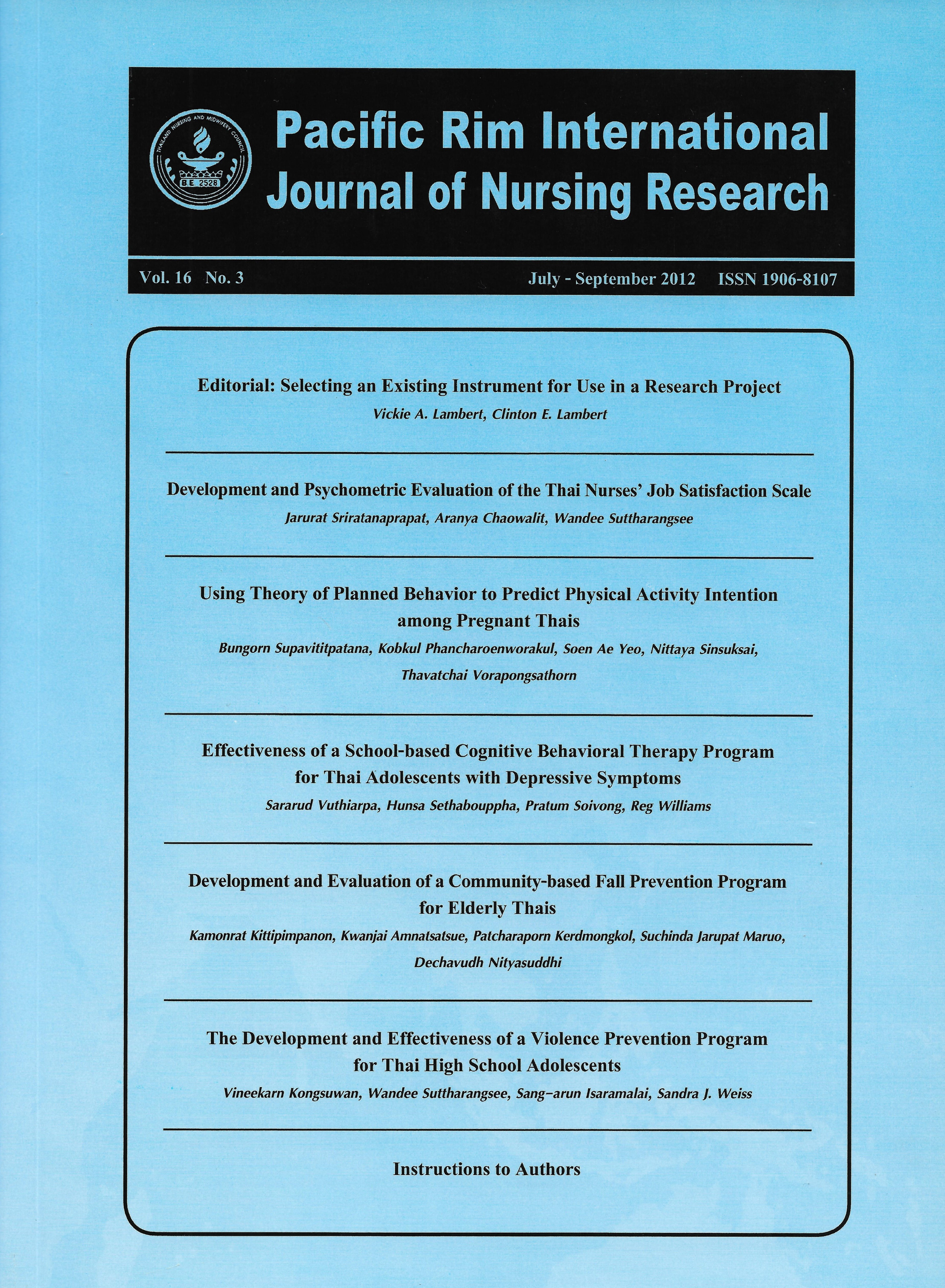Development and Psychometric Evaluation of the Thai Nurses’ Job Satisfaction Scale
Keywords:
ความพึงพอใจในการทำงาน, การประเมินคุณสมบัติเครื่องมือวิจัย, พยาบาลไทย, และการพัฒนาเครื่องมือวิจัย, Job satisfaction, Psychometric evaluation, Thai nurses, Tool developmentAbstract
บทคัดย่อ
วัตถุประสงค์ของวิจัยนี้คือการพัฒนาเครื่องมือวิจัยวัดความพึงพอใจในการทำงานของพยาบาลไทยและประเมินคุณภาพของเครื่องมือนี้ ผู้วิจัยพัฒนาเครื่องมือนี้จากการวิเคราะห์แนวความคิดของความพึงพอใจในการทำงานภายใต้บริบทวัฒธรรมเอเชีย การสัมภาษณ์พยาบาลไทยและการทบทวนวรรณกรรมอย่างลึกซึ้ง การตรวจสอบคุณภาพเครื่องมือทำโดยใช้การสุ่มตัวอย่างพยาบาล 963 คนจากโรงพยาบาลทั่วไปของรัฐบาล 12 โรงพยาบาลซึ่งเป็นตัวแทนจาก 6 ภูมิภาคของประเทศไทย และเนื่องจากวัฒนธรรมไทยโดยเฉพาะเรื่องความแตกต่างของชนชั้น (ผู้ที่ด้อยกว่าในองค์กรยอมรับและคาดหวังให้มีการกระจายอำนาจอย่างเท่าเทียมกัน)และความเกรงใจ (ไม่ทำให้ผู้อื่นไม่สบายใจหรือไม่สะดวก)ผู้วิจัยจึงแนบแบบสอบถามความเป็นที่พึงพอใจของสังคมควบคู่กับเครื่องมือวิจัยนี้ให้กับผู้ร่วมวิจัยด้วย
การทดสอบความตรงตามเนื้อเรื่องของเครื่องมือทำโดยผู้เชี่ยวชาญ ในขณะที่การประเมินความตรงตามโครงสร้างได้ใช้การวิเคราะห์องค์ประกอบและการทดสอบสมมุติฐาน ส่วนการวัดความเที่ยงทำโดยการวดั ความสอดคลอ้ งภายในโดยการคำนวณค่า สัม ประสิทธิ์แอลฟาของครอนบาคและความคงเสน้คงวาโดยการทำวิธีการสอบซํ้า
เครื่องมือวิจัยนี้มี 107 ข้อคำถามซึ่งประกอบด้วย 8 องค์ประกอบคือ ผลตอบแทน การมีเอกสิทธิและการได้รับการสำคัญทางวิชาชีพ ผู้ตรวจการทางการพยาบาล สังคมที่ทำงาน ภาระงาน สิ่งแวดล้อมที่ทำงาน นโยบายและระบบทางการพยาบาล และการแสดงออกที่เหมาะสมในการเผชิญสถานการณ์ที่ลำบากใจ ความสัมพันธ์ระหว่างคะแนนรวมจากแบบสอบถามความเป็นที่พีงพอใจของสังคมกับ คะแนนรวมจากเครื่องมือวิจัยนี้พบว่า มีนัยสำคัญน้อยมากซึ่งสะท้อนให้เห็นว่า วัฒนธรรมความแตกต่างของชนชั้นและความเกรงใจไม่ได้มีผลกับการตอบแบบสอบถามของพยาบาล ส่วนผลการทดสอบความตรงตามโครงสร้าง ความตรงตามเนื้อเรื่อง และการวัดความเที่ยงนั้นให้ผลเป็นที่น่าพอใจ
เครื่องมือวิจัยนี้มีความเที่ยงและความตรงเพียงพอที่จะใช้ในการประเมินความพึงพอใจในการทำงานของพยาบาลไทย อย่างไรก็ตาม การวิจัยในอนาคตเป็นสิ่งจำเป็นเพื่อการปรับปรุงเครื่องมือให้ดีขึ้นและประเมินการนำไปใช้ในการวัดความพึงพอใจในการทำงานของพยาบาลในโรงพยาบาลสังกัดอื่นๆ ทั่วประเทศไทย
คำสำคัญ: ความพึงพอใจในการทำงาน; การประเมินคุณสมบัติเครื่องมือวิจัย; พยาบาลไทย; และการพัฒนาเครื่องมือวิจัย
Abstract
The purposes of this research were to: develop the “Job Satisfaction Scalefor Thai Nurses (TNJSS)”; and, determine the psychometric properties of the TNJSS. Theresearcher-developed TNJSS was based on an analysis of the concept of job satisfactionwithin the context of Asian cultures, in-depth interviews of Thai nurses and an extensivereview of the literature. The scale’s psychometric properties were determined using 963randomly-selected nurses from 12 general hospitals, administered by the government,that represented all regions of Thailand. Due to a large power distance (extent to whichthe less powerful members of organizations/institutions accept and expect power to bedistributed unequally) and Kreng Jai (not causing discomfort or inconvenience to others)being of importance in the Thai culture, the Social Desirability Scale-17 (SDS-17) wasdistributed to subjects along with the TNJSS.
Content validity of the scale was examined via three experts in administration andinstrument development. The three experts also determined the tool’s items adequatelyrepresented the content domain. The instrument’s construct validity was assessed via factoranalysis and hypothesis testing. The scale’s internal consistency reliability was examinedby way of Cronbach’s alpha and its stability was tested using the test-retest method.
The final version of the 107-item TNJSS was found to measure eight factors:incentives; professional autonomy and recognition; nursing supervisor; social aspect atwork; workload; work environment; nursing policies and system; and, assertiveness inconfronting difficulties. A significantly weak correlation was found between the totalscores of the SDS-17 and the TNJSS, suggesting the presence of a large power distanceand Kreng Jai were not factors in the nurses’ responses. The construct and content validity,and the reliability of the scale were found to be satisfactory.
The results revealed the TNJSS to be a psychometrically valid and reliable tool forevaluating Thai nurses’ job satisfaction. However, future research is needed to refine theinstrument and to assess its applicability in measuring job satisfaction of nurses workingin hospitals, throughout Thailand, that are not administered by the government.
Keywords: Job satisfaction; Psychometric evaluation; Thai nurses; Tool development
Downloads
How to Cite
Issue
Section
License
Copyright: The Pacific Rim International Journal of Nursing Research, Thailand Nursing & Midwifery Council has exclusive rights to publish, reproduce and distribute the manuscript and all contents therein.








.png)



